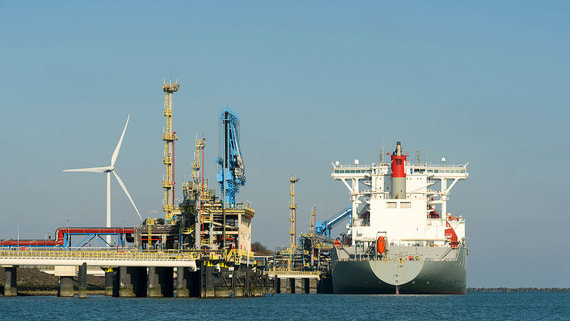EU imports record volumes of LNG from Russia
[ad_1]

In 2023, the EU countries intend to purchase record volumes of liquefied natural gas (LNG) from Russia, despite the desire of the union to abandon Russian fuel by 2027. In the first seven months of this year, Russian LNG imports increased by 40% (from 15 million to 22 million cubic meters) compared to the same period in 2021. This makes Russia the second fuel supplier to the EU after the United States, according to a study by the international non-governmental organization Global Witness. During this period, according to their estimates, European states spent almost 5.3 billion euros on the purchase of Russian LNG.
According to Global Witness, from January to July 2023, the EU share in Russian LNG exports was 52%, last year it was 49%, and in 2021 – 39%. Analysts noted that the growth of European LNG imports from Russia over the year (40%) significantly outpaced the global average increase in LNG sales, which amounted to 6%. Spain (18% of Russia’s total sales) and Belgium (17%) became the leaders in the volume of imported Russian liquefied gas after China.
At the beginning of the NWO, the growth of Russian LNG imports was insignificant. According to industry analyst Kpler, in January-July 2022, EU countries imported 1.7% more Russian LNG than in the same record period last year. According to the Financial Times newspaper, most of the Russian volumes come from the Yamal LNG plant, the controlling stake of which belongs to the Russian company Novatek (50.1%). The remaining stakes belong to the French Total Energies (20%), the Chinese CNPC (20%) and the Chinese state Silk Road Fund (9.9%). The sharp jump in Russian LNG imports, the journalists of the publication believe, could have occurred due to a low base, since before the hostilities in Ukraine, the EU did not import significant volumes of LNG due to its dependence on pipeline gas from Russia.
There are currently no direct bans on the supply of Russian gas to the EU within the framework of 11 sanctions packages. At the end of March, EU energy ministers approved granting member states the right to impose a ban on LNG imports from Russia without imposing new sanctions by the EU itself.
Some European countries have already decided to unilaterally abandon Russian LNG. The UK, which is not a member of the EU, has banned supplies since January 2023. Germany also wants to abandon liquefied natural gas from Russia, Bloomberg reported, citing a German government document, without specifying a timeframe. In March 2023, the agency, citing sources, wrote that the Spanish government sent letters to companies in the country asking them not to enter into new agreements on the supply of Russian gas.
According to the Russian Ministry of Energy, earlier, in 2022, total LNG exports from Russia increased by 7.8% compared to 2021 to 45.7 billion cubic meters. m (hereinafter in the equivalent of pipeline gas). According to consulting company B1 (formerly EY in Russia), the share of Europe, including the UK, in LNG exports from Russia in 2022 was 50.5% against 46.3% a year earlier. LNG supplies from Russia to the EU countries and the UK increased by almost 19% in 2022.
In 2022, the largest importers of Russian LNG in Europe, according to B1, were France – 7.9 billion cubic meters. m (increased imports by 44% compared to 2021), Belgium – 6 billion cubic meters. m (an increase of 2.3 times), Spain – 5 billion cubic meters. m (+44%) and the Netherlands – 2.4 billion cubic meters. m (-18%). Also in 2022, the United Kingdom (until March), Portugal, Italy, Greece and Lithuania imported Russian LNG, but in January 2023, according to B1, there were no deliveries to these countries. According to the association of European underground gas storage operators Gas Infrastructure Europe, in 2022 the total import of LNG to the EU (from all sources) increased by 1.7 times compared to 2021 to 127.2 billion cubic meters. m.
Against the backdrop of a decline in pipeline gas supplies from Russia and a limited increase in global LNG production capacity in 2022–2023. There are currently no free capacities on the LNG market, which is forcing the EU to continue buying Novatek products, says Sergei Kaufman, an analyst at FG Finam. Locally, LNG prices from Yamal LNG may also be lower than spot prices, since about 75% of supplies from the project are pegged to oil prices. But LNG supplies to the EU as a whole could soon start to decline, as there is a risk that underground gas storage facilities in the EU will overflow even before the heating season starts, Kaufman continues. “If you look at supplies from Yamal LNG, last year they exceeded 16 million tons, but this year, in our opinion, the result may be lower by about 0.5–1.0 million tons. This may be due to with an expected decline in production at Yamal LNG and a likely decrease in exports to Europe in the coming months,” the expert believes.
The risk of the EU abandoning Russian LNG certainly exists, but this is not a prospect for the next 1-2 years, Kaufman continues. First, the EU will completely overcome dependence on Gazprom’s gas, and only then, in conditions when the supply of LNG on the world market will actively grow, can it move on to abandoning Russian LNG, the expert believes.
[ad_2]
Source link






